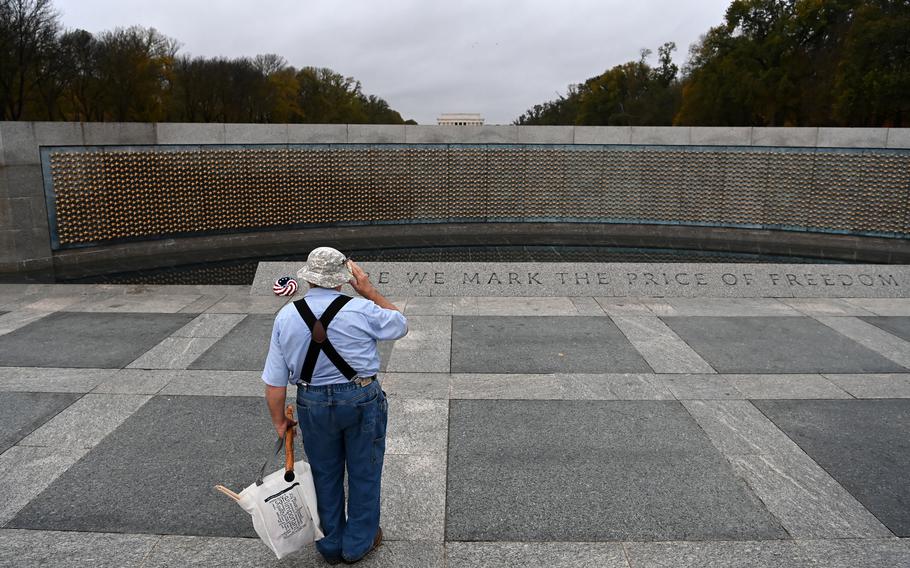
Vietnam veteran Bernie Klemanek, of Mineral, Va., salutes while visiting the World War II Memorial on Veterans Day in 2020. (Matt McClain/The Washington Post)
In advance of Veterans Day on Saturday, the Department of Veterans Affairs began its celebration by honoring itself.
Monday’s announcement that the Biden administration “delivered more care and more benefits to more Veterans than ever before in fiscal year 2023” certainly is worthy of self-praise - and appreciation by vets and the public.
Yet, there’s more to the story, including from government watchdog agencies that cite shortcomings that department officials don’t highlight.
Indeed, the department’s list of accomplishments is impressive for an agency that less than a decade ago was so mired in scandal over the coverup on long veterans’ health care wait times and foul treatment of whistleblowers that former VA Secretary Eric Shinseki resigned in 2014.
Now, the department’s congratulatory press release has 11 bullet points of “all-time record accomplishments” including:
Delivering “more than 116 million health care appointments to Veterans, surpassing the previous all-time record by more than 3 million appointments”
Processing 1.9 million “Veteran and survivor claims, surpassing the previous all-time record by 15.9%”
Encouraging vets to submit benefit claims, leading to 2.4 million claims applications — “an all-time record and 39% more than in 2022”
Distributing “$163 billion in earned benefits, including $150 billion in compensation and pension benefits, to 1,535,685 Veterans and survivors — all of which are all-time records.”
VA Secretary Denis McDonough expanded on the announcement with additional departmental acclaim in a Monday speech at the National Press Club, but he also focused more on veterans themselves.
“Veterans Day is a day to honor vets,” he told journalists, “to remember what they’ve done for our nation, and to recognize that when those vets serve and sacrifice, so do their families, their caregivers, their survivors.”
He planned to honor them at several events that day, including visiting Arlington National Cemetery with Vice President Harris.
Consistent with this hyperpartisan time, a key Republican threw shade on the Biden administration’s celebratory parade.
“With a record investment in VA over the past decade, it should come as no surprise that VA continues to provide care and services to veterans,” Rep. Mike Bost (Ill.), chairman of the House Committee on Veterans’ Affairs, told The Washington Post. “Despite the thousands of dedicated employees who help veterans every day, their efforts are crippled by red tape and a bloated bureaucracy.”
His Senate counterpart, Sen. Jon Tester (D-Mont.), chairman of that chamber’s veterans’ panel, had no criticism of the administration, but also did not celebrate the accomplishments in an email that focused more on what he’s done for vets. “I’m holding VA accountable to make good on the progress we’ve made,” he said. “We still have work to do, and I’ll continue my push to hire and keep talented clinicians serving our veterans, especially in rural areas.”
McDonough welcomed accountability in his remarks, even from journalists, some of whom he mentioned by name. “You all make VA better, telling the stories that need to be told and holding us accountable to veterans and their survivors,” he said, with compliments for reporters not often heard from public officials.
An important part of that accountability is focusing on the needs of vets and ensuring their accessibility to services and benefits.
“We underscore the vital importance,” the secretary emphasized, of “putting vets in the center of all we do. Every door at VA has to be a front door.”
But those doors are open to some veterans more than others.
An October Government Accountability Office (GAO) report says VA approved significantly fewer initial disability compensation claims from members of the Reserves and National Guard, compared to those on active duty from 2012 through 2021, with VA and the Pentagon unaware of the discrepancy. GAO found that Reserve and Guard members “do not always understand the importance of immediately documenting health conditions to support any future disability compensation claims,” and Defense and VA officials don’t “address this knowledge gap.” GAO also said getting service dates to support claims is difficult. The agencies accepted GAO recommendations to improve service.
An October VA inspector general report found improvements are needed in lung cancer screening through the department’s community care program. Inspectors reviewed the program’s low-dose CT scan resources and management, “and identified barriers impacting timely and quality screening for patients.” VA concurred with the inspector general’s recommendations to take corrective action.
My Veterans Day column last year about racial inequalities quoted a VA official acknowledging “there are disparities in discharge status due to racism, which unfairly disadvantage Black Veterans and, sometimes, wrongly leave Black Veterans without access to VA care and benefits.”
Nancy Espinosa, national commander of Disabled American Veterans and a disabled vet with 15 years of military experience, applauded VA accomplishments while calling for improvements “to ensure veterans receive timely access to the benefits and high-quality care they deserve and have earned through their service.”
That’s a point Biden made to McDonough: “Fight like hell for vets, for families, caregivers, survivors,” the secretary recalled the president telling him.
“That’s our North Star,” McDonough said. “So, we ask ourselves, are we fighting like hell for vets? That’s what we seek to do every day.”